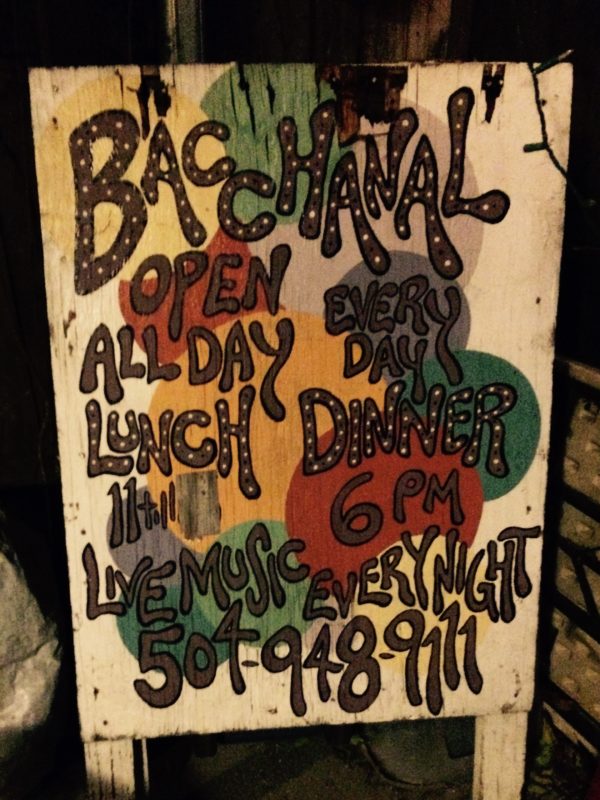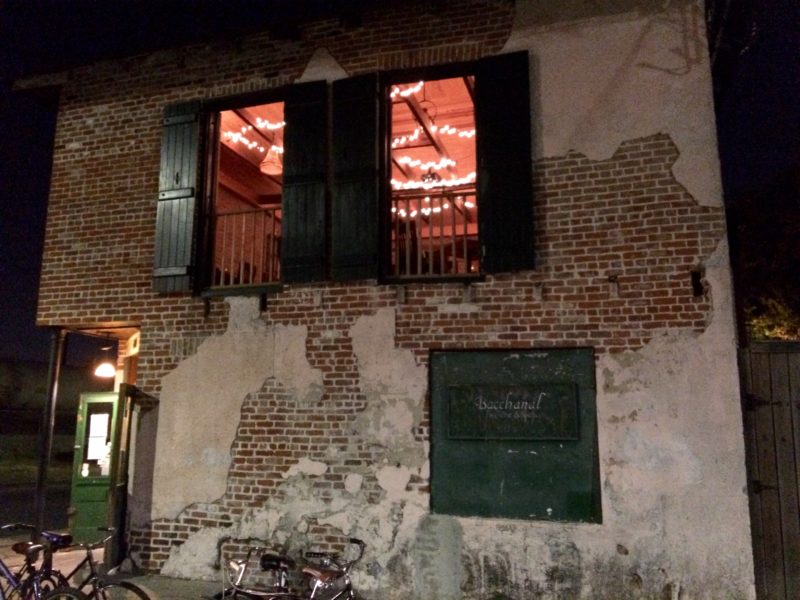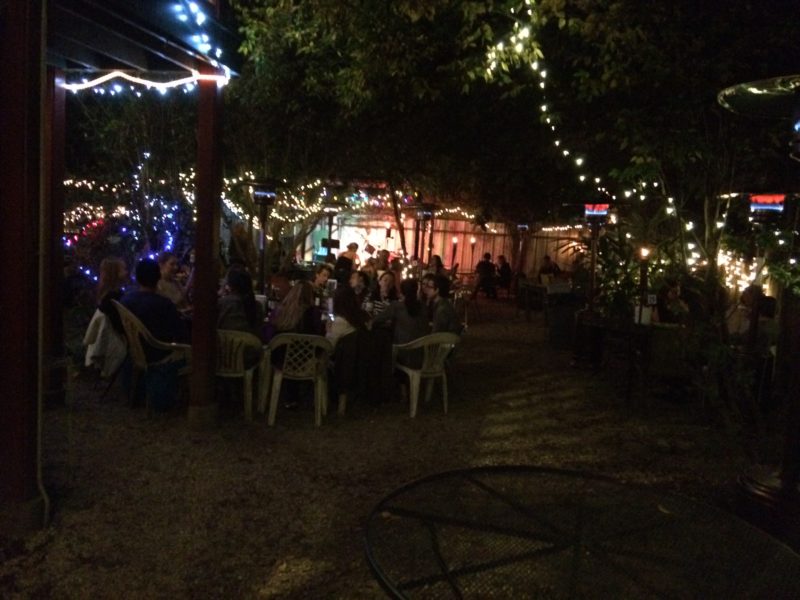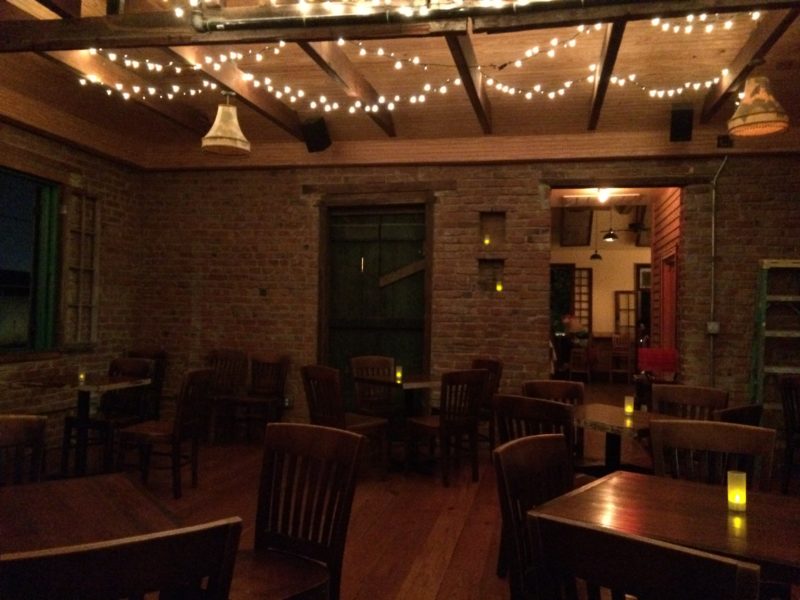
Bacchanal’s outdoor sandwich sign. Photo taken by Katy Chappellie
“Bacchanal” sets a unique atmosphere. The comprehensive wine selection when you first walk in is somewhat deceptive. Coupled with an equally impressive cheese selection, it creates an upmarket feel. That feeling is erased when the visitor goes to the dining and music area of Bacchanal. The relaxed dining area is an expansive outdoor area shaded with trees, lit with Christmas lights and Tiki-torches, and decorated with mismatched plastic tables and chairs. The customer is surprised once again when he or she sees the impressive menu. Head Chef Joaquin Rodas has created a complex and diverse menu that has included many unique items ranging from bacon wrapped dates to squid ink pasta. In addition to all of this, Bacchanal hosts live music seven nights a week, every week. Bacchanal is open from 11am until midnight or later and serves a discreet cultural Mecca for New Orleans (“Welcome.” Bacchanal Wine. Accessed June 26, 2017. http://www.bacchanalwine.com/).

Bacchanal’s unique exterior, with the glowing upper floor on display. Photo taken by Katy Chappellie
To delve into the rich history of Bacchanal, we sat down with Beaux Ross, the co-owner and man in charge of media, music, and marketing for Bacchanal. We were able to use his information along with other research to create a thorough history of Bacchanal’s location and mantra.
It all started when owner Chris Rudge first opened Bacchanal in 2002. When Katrina hit Bacchanal with strong force, all the retail that made it a quirky little wine bar was flooded and ruined. Instead of letting this hurt the venue, Rudge and others were able to create something amazing called “Bacchanal Sundays.” On these Sundays Bacchanal “hosted” other chefs that were unemployed due to storm related restaurant closures. These chefs were able to cook using Bacchanal’s tools and venue, restoring hope not only for the restaurants and chefs involved, but also the residents of the Bywater. Pete Vasquez was a key player in Bacchanal Sundays. Vasquez of the restaurant Marisol ignited the event when he set up a mobile kitchen behind Bacchanal. Soon other chefs joined in the rotation, creating an exciting food/wine/music venue. This was one of the decisions made by the owners that really put Bacchanal on the map as one of the go-to places in New Orleans (McNulty, Ian. “Big changes at Bacchanal.” Gambit. March 13, 2017. Accessed June 26, 2017. http://www.bestofneworleans.com/blogofneworleans/archives/2011/08/30/big-changes-at-bacchanal). Bacchanal Sundays helped the owners realize the true vision of what the restaurant could be. This realization was that in order to fulfill the potential of this local hot spot, they needed to have music seven nights a week. They also needed a resident chef. Bacchanal was able to obtain both a food and music license with the immense support of the community (Hancock, Alexander. “Bacchanal Shut Down For Operating Without Proper Permits.” Eater New Orleans. August 31, 2011. Accessed June 26, 2017. http://nola.eater.com/2011/8/31/6656681/bacchanal-shut-down-for-operating-without-proper-permits). Today Bacchanal continues to have music seven nights a week, weekly wine tasting, and even an upstairs cocktail bar (Ross, Beaux. Interviewed by Katy Chappellie, Dana Ohlson. Audio Interview. Bacchanal, 12/2/14).

The outdoor patio from above. Photo taken by Katy Chappellie
Bacchanal has live music seven nights a week, but the music is always some form of jazz. While part-owner Beaux professed that “jazz fits wine”, and that he loves jazz, the humble beginnings of Bacchanal also shaped why Jazz is the main theme of the venue. When Bacchanal was first establishing itself in the community of the Bywater, the owners had to rely on the people and the culture of New Orleans to define its personality as a venue. Beaux referred to this as an “organic evolution”. Since Bacchanal was a seven day a week live music venue from the start, management had to rely on musicians in need of exposure to perform. These musicians were happy for their music to simply reach people and were willing to play at the pay-scale that the young Bacchanal could provide. Luckily at the time New Orleans had “an amazing pool of talent who were eager to get original music out there.” Almost all of these musicians fell into the hard bop, or straight-ahead jazz genre, which is what Bacchanal mainly caters to today. Some other forms of Jazz Bacchanal hosts include gypsy jazz and traditional jazz (Beaux Ross).

A more level view of the backyard. Photo taken by Katy Chappellie
While Bacchanal Sundays created the vision of music seven days a week and a full time chef, Bacchanal still didn’t have a food or music license. As Bacchanal grew in popularity, this fact became more and more daunting as running a bootleg venue became riskier. One Friday night Bacchanal was raided by the police, and food and music operations were shut down for a time. After an abundance of legal harassment, Bacchanal was called to city hall to go on trial for licensing issues. Bacchanal seemed destined to fail, as Bacchanal’s paperwork pleading to remain a working venue were stamped “deny with prejudice” by City Hall workers, the true personality of Bacchanal came shining through. In a display of community that City Hall Judges had never seen before, thirty or so community members woke up on a Monday morning, took to a microphone, and pleaded for Bacchanal’s sake. They told touching stories and explained how much Bacchanal brings to the community. By the end of the locals’ testaments, the board in charge of Bacchanal’s fate was emotionally overwhelmed and made the realization that Bacchanal needed to stay. When speaking of how Bacchanal won that day, owner Beaux spoke of City Hall and said, “I don’t think we beat them, they just joined us in victory”. This quote illustrates how city hall came to join in on the happiness and culture that Bacchanal brought to New Orleans. Bacchanal’s influence changed the neighborhood for the better, created a relaxed venue for the arts and instilled a stronger sense of community in the Bywater (Beaux Ross).

The warm and glowing interior. Photo taken by Katy Chappellie
The definition of bacchanal is “an occasion of wild and drunken revelry”, and some older stories of Bacchanal live up to its name. In addition to the mud wrestling they were known to have entertained, one of the more bizarre (and dangerous) amusements was Roman candle wars. On numerous occasions Bacchanal would sponsor these wars in which people would go out and line the streets while two opponents would shoot each other with Roman candles. While Beaux admits that this was crazy, stupid, dangerous, and could have shut down Bacchanal forever, he believes that the memory of these wars, “captures the anarchic spirit of the place and how it evolved” (Beaux Ross).
 NOLAbeings Multimedia artist Claire Bangser created NOLAbeings as a portrait-based story project that marries...
NOLAbeings Multimedia artist Claire Bangser created NOLAbeings as a portrait-based story project that marries...  Voodoo in New Orleans: Reviving history: New Orleans fortune telling This article takes a deep dive into the history of Voodoo in New Orleans, its hybridization with Catholicism, and its present-day place in the city's culture. The author visits fortune-tellers in the French Quarter, using their guidance as a tool for introspection rather than a deterministic predictor of the future. Through her experiences in New Orleans, the author feels a mystical connection to both the past and the future.
Voodoo in New Orleans: Reviving history: New Orleans fortune telling This article takes a deep dive into the history of Voodoo in New Orleans, its hybridization with Catholicism, and its present-day place in the city's culture. The author visits fortune-tellers in the French Quarter, using their guidance as a tool for introspection rather than a deterministic predictor of the future. Through her experiences in New Orleans, the author feels a mystical connection to both the past and the future. 
[…] Gem #5: Bacchanal […]
[…] a shutdown of food and music operations, and a community who simply was not having that. A story on Via NOLA Vie explains the day Bacchanal went on trial for operating without proper licenses, and how roughly 30 […]
[…] piece has been edited for content, and the original was published on November 19, 2014 on […]